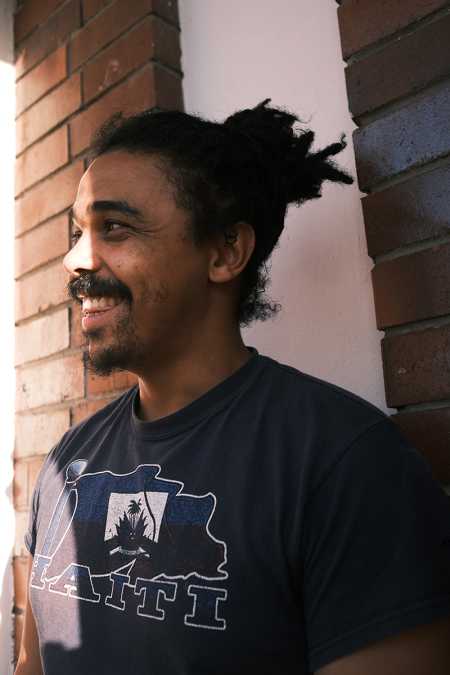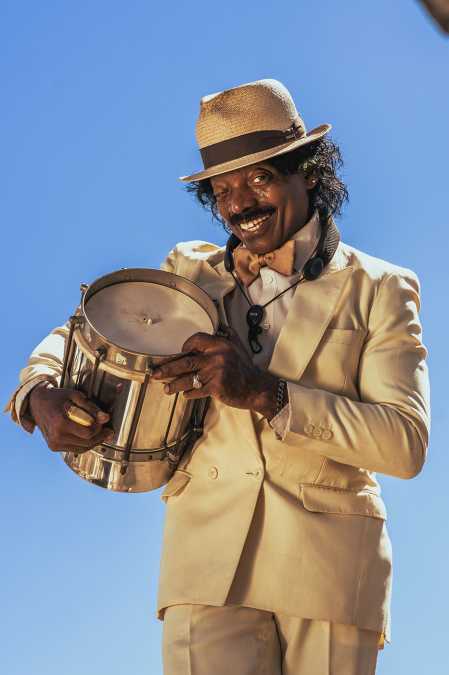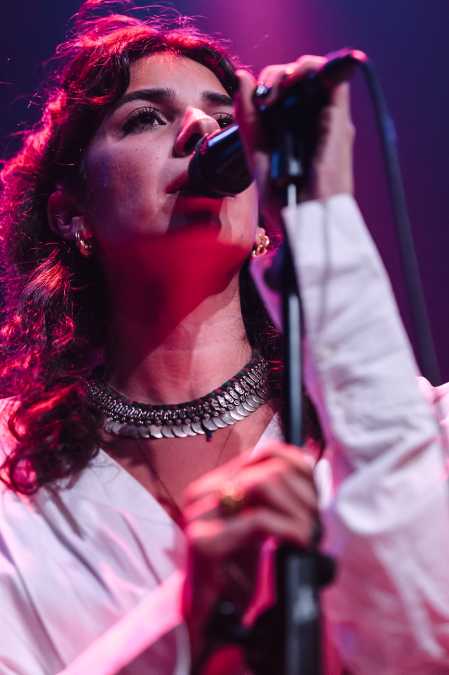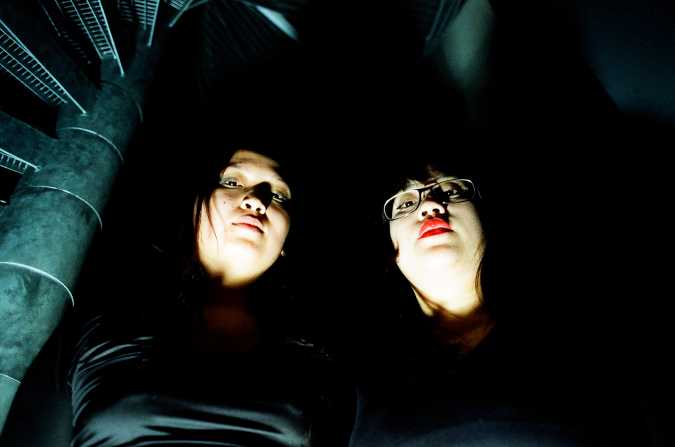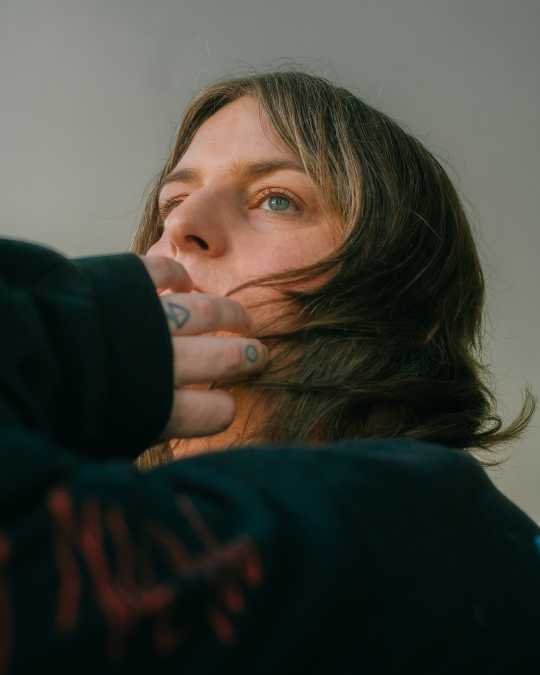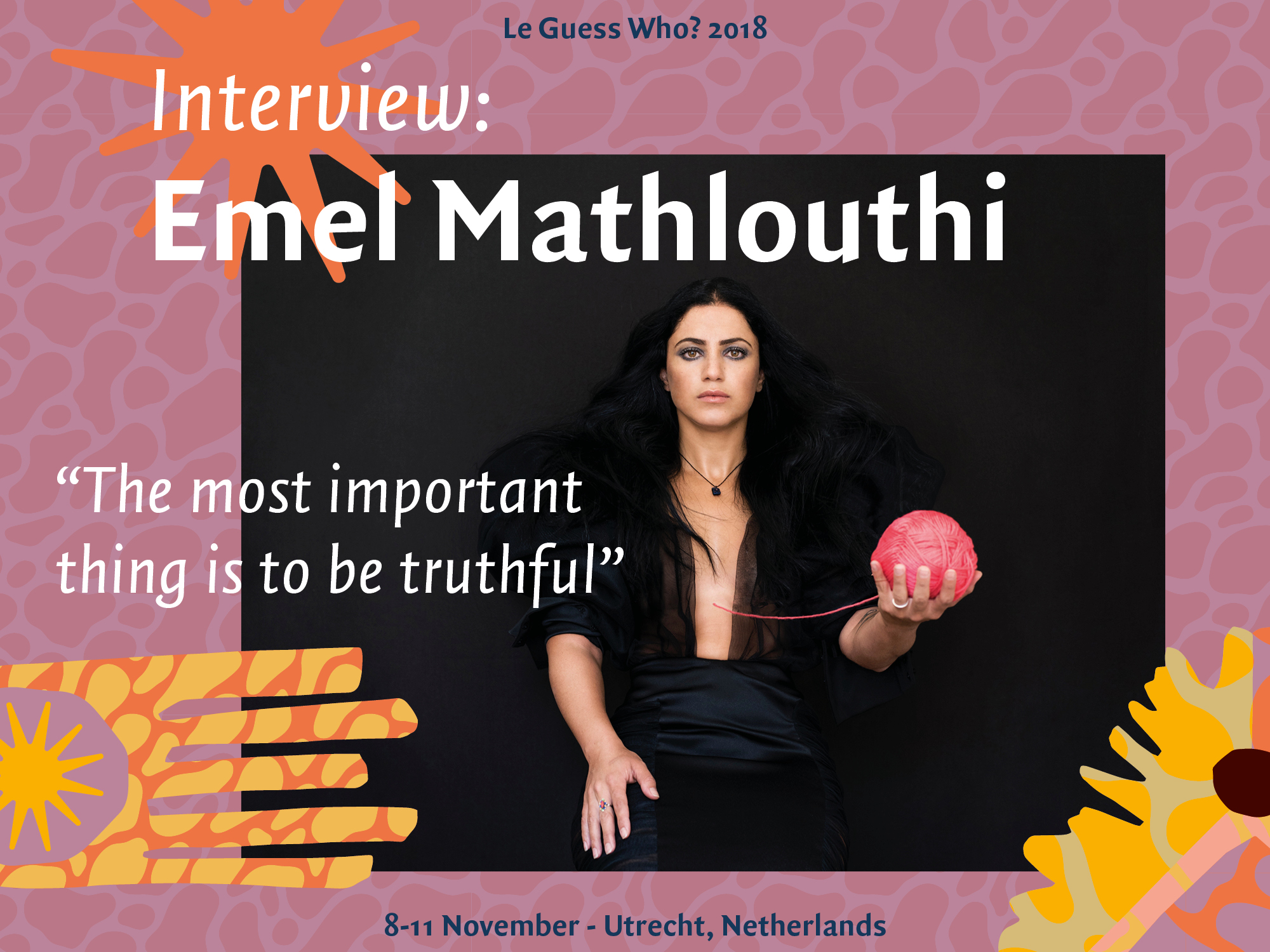
Ahead of her performance at Le Guess Who?, we catch up with Tunisian singer, musician & artist Emel Mathlouthi while on her way to a performance in Washington DC. It became a talk about being challenged by collaborators, the Arab Spring and the role of social media, being categorized by singing in Arabic, and the importance of being truthful.
To remotely grasp what drives Emel Mathlouthi (36), consider the following two extremes. The first being her majestic rendition of Kelmti Horra (My Word Is Free) at the 2015 Nobel Prize Ceremony. This song became an anthem for the Arab Spring, a global uprising that began in Mathlouthi’s homeland of Tunisia on December 10, 2010.
Exactly five years and one day later, with Tunisia still free from its autocratic shackles, Mathlouthi is greeted by thousands of LCD screens forming a cluster of stars. It’s an oddly beautiful sight, knowing that technology and social media played a big part in mobilizing massive protests in the Arab world against their oppressors. Once the orchestra swelled and Mathlouthi belted out with radiant abandon, these digital devices suddenly expressed something wholly spiritual and empathetic. In an age when humanity gets more dumbed down and cynical by the use of tech, this occurrence feels like entering a tranquil port in the eye of a raging storm.
Which brings us to the other extreme Emel Mathlouthi avidly explores: a boundary-pushing alchemy between the electronic and the spiritual. Suffice to say, it’s a far cry from the now somewhat quaint protest singer-narrative that’s been perpetuated since the early 60s. Mathlouthi herself is all too aware of that narrative, by the way, citing Joan Baez as a formative influence in numerous interviews.
That being said, a strong-willed artist like her is naturally attuned to the pulse of this perplexing reality we live in now. More specifically, discordant sounds that honestly reflect said reality. The final composition on her Reworkings album 'Ensenity', a collaboration with producer tandem Agf/Delay, turns her song Thamlaton into something unruly and visceral, something more akin to Prurient or Gazelle Twin than a balladeer wielding a six-string guitar. The original track’s upright bass motif, retextured to the forefront, riddles with the same menace as a Bernard Herrmann score. Mathlouthi’s supple, bewitching vocal flourishes get underpinned further and further as the feverish soundscapes build towards the track's climax: a jackhammering incursion of distorted noise, simmering within an inferno of anguished howls and snarls layered on top of one another.
By any criterion, it’s pretty astounding how all of this can pour out of a single individual. When we connect with Mathlouthi on the phone, we can’t help but wonder how she mediates all these extremes and complexities. In her more recent interviews, she has bristled somewhat against her initial typecast as protest singer and symbol for ‘the revolution’. When it comes to communicating either a romantic, sentimental ideal or truthful, blemished humanity, Emel Mathlouthi rejects the notion that one would even have to choose.
“The most important thing is to be truthful,” she asserts. “To be completely and entirely yourself. Otherwise, why share anything at all if it isn’t out of passion or our deep soul? That’s what I want to share and expose: introspection, emotion, and passion. It can’t be trivial at any time. I’m not interested in bringing anything less. That’s why I would like to see myself evolve to different places, different spaces inside myself. I need to be constantly evolving, because we change and experience a lot of different things along the way. And it’s essential that the music reflects that: both the evolution and the maturity.”
Reworkings, not remixes
When we exchange our first thoughts, Mathlouthi is on her way to Dupont Underground, a venue located at the outskirts of Washington DC. Along with fellow Ensenity-collaborator Ash Koosha, she was invited to an event organized by the Artistic Freedom Initiative (AFI), a project initiated by the SDK Foundation for Human Dignity. AFI is comprised of human rights activists, lawyers, artists, and academic thinkers. Their goal: to facilitate and safeguard artists in exile, promote their work locally and abroad, and finally, make the climate of free expression more feasible in countries that enforce censorship on the arts.
Despite being noticeably sick on the other end of the line – frequently coughing in-between answers –, Mathlouthi intends on powering all the way through today. After all, AFI’s mission crystallizes cogently with her own: to give subjugated, suppressed individuals a voice. You see, with Ensenity, Mathlouthi doesn’t just assess where and how far she can take her art. The record is also a means to elevate and share the work of her peers and collaborators to a broader audience. “When I reach out to people to collaborate with, I take their mentality, their talents, and their creativity into account,” she attests. “I don’t care if they’re well-established or unknown. I’m desperate to reach out to people who try to innovate and bring some stimulation into our world. For me, that’s the most crucial thing.”
Some artists, such as the aforementioned Ash Koosha, she discovered via outlets like Pitchfork and The Fader. Whereas with other artists, the connection is far more established. One of them being Mettani, a French-Tunisian musician who’s a member of Arabstazy, a collective of DJs, videographers and producers in the slipstream of post-revolution musical innovation across the Arabic world. He also spearheads nascent record label Shouka, releasing artists who break down uninformed Western notions of traditional music from the Middle East.
As it turns out, Mettani and Mathlouthi were already in cahoots during the mid-00s, sharing a fascination for heavy metal, rock, avant-garde, and trip-hop within a conclave of friends and creatives. Tunisia was still a dictatorship at the time, so free-thinking art and expression were naturally a self-contained but vital proving ground to build deep-seated social and political ideals. Mathlouthi: “We all had metal bands before, and we all played the guitar. We all were kind of looking for edgy things, edgy sounds. But I didn’t get to work with Mettani right away.” She recalls how she met him through a close mutual friend, and it took some time for them to develop a good chemistry.
Mettani has now become one of Mathlouthi’s closest collaborators, co-producing her second LP 'Ensen' and setting the ominous first tone on Ensenity. Opening cut 'Braibtek' immediately flaunts with that exhilarating, forward-thinking filigree of traditional and modern sounds. Anchored by Mathlouthi’s transcendent vocal delivery, this track takes a full five minutes to build its suspense. Melodies dissolve and snuff out as the music gradually tightens its steely vise grip on the listener, submerging into a cavernous electro-industrial barrage. Even if you don’t understand a lick of Arabic, this is one heartstopping and intrusive aural experience.
Through the lens of her “carefully chosen” collaborators, Mathlouthi slyly flirts with many different styles all across Ensenity. The Free The Robots interpretation of Salem, for example, channels the vintage hip-hop productions of Adrian Younge, yet still doesn’t feel out of place. Alternately, Ash Koosha reframes Kaddesh with his trademark slithery glitchtronica loops, cutting up Mathlouthi’s vocals to generate strange, bewildering textures.
Indeed, many artists do remix-compilations to bolster new momentum for their previous LPs. But given the carefully plotted dynamics and pacing applied to these reworked tracks, somehow, Ensenity feels very much like a cohesive entity standing on its own. That’s precisely why Mathlouthi made a point of branding these songs ‘reworkings’ instead of remixes. “Because I felt just the word ‘remix’ didn’t do the songs justice to begin with. Or the artists I worked with for that matter. All of my collaborators were very gracious and devoted their talents to produce these different versions. And that’s what I was interested in. More so than someone who was just going to add specific arrangements. I wanted to hear these songs from another vision, so I gave everyone I approached a carte blanche. These are people who push the limits, I knew they would take the songs and the tracks to a different level. That’s very interesting to me because it inspires me to push my own creativity further."

Expanding, connecting and reacting
Mathlouthi recently did another leg of shows in Tunisia, which is always a big deal, because just a decade ago, her music was still banned everywhere. Since the revolt, Tunisia remains a compelling case study on whether we as a human species could finally exist with each other, in tolerance. A segment from Michael Moore’s 2015 documentary 'Where To Invade Next' highlights the Tunisian government’s progressive stance on birth control rights for women: abortion has been legal since 1973. “In Tunisia, there is more progressive movement that made women more in possession of their intuition, rights, and ideas. And in that regard, we have some privileges compared to other countries.”
Unfortunately, the country’s early-decade idealism seems to have waned amidst clashes between the Islamic Salafists and the secular police in the regional areas. Tensions are still prevalent, and understandably so, with so many factions hatching conflicting ideas on how to navigate this still transient North African nation into the future. During the Arab Spring, social media was a powerful tool to mobilize people quickly, but lately, the cons seem to outweigh the pros. Even Mathlouthi, as an adjacent witness to both sides of that equation, appears to have resigned to that as well.
“There used to be a time when social media started, it could spark the next wave of change,” she sighs. “But unfortunately, I think that moment has passed. Now it’s just inflating everyone. I have to be honest; when it started, it was an effective way for me to promote and share my work. I love sharing with my followers, changing people, reading everybody’s messages. I try to react to everyone, it’s nice to reach out to people who are very sensitive to what you do. That aspect has been very fulfilling. But at the same time, we’ve just become zombies. The music business is starting to use that against us; the artists not only have to produce, create and perform. But next to that, they’re also expected to be their own publicist, promoter, and generate their own audience in the venue. It’s just not sane. It’s not healthy. You end up talking about why people should come to see you, instead of trying to share a work of art.”
Despite the many obstacles she faces, Mathlouthi is determined to use her art to straddle the chasms people have created for themselves and their surroundings. Though she hasn’t lived in Tunisia for over a decade (she now lives in Harlem, New York with her husband and daughter), the connection with her homeland only seems to become stronger and stronger. During the Arab Spring, she was right at the heart of the protests, her resplendent voice soaring over the mayhem and confusion on the streets. Mathlouthi’s conviction to bring her music to the peripheries, to sow a seed of hope, inspiration, and inclusivity, has carried over after she fled Tunisia for Paris in 2007, all the way to her current life in New York.
Though a big metropolitan city is often brimmed with proper venues for live music, Mathlouthi stresses the need for playing colleges, art spaces, and libraries, places where people are hungry for knowledge and communion.“I think it’s important to bring live music anywhere if that’s possible. I think that the last connection we have to our most positive human side. That’s the only way for us to build bridges toward one another, to be more empathetic and more humane. So it’s essential, to remind the artists that this is essential to what we do.”
Mathlouthi has announced that her upcoming album will be primarily sung in English. A choice not out of compromise to obtain a broader audience. Far from it. Mathlouthi: “There is some kind of segregation that once you sing in Arabic, somehow the only place it immediately belongs to is ‘world music’. Which is a big mistake because you end up performing for particular types of audiences who don’t necessarily get what you do. Nowadays, it’s not exactly the time for ‘big singers’. Especially within the electronic music scene, it's more of a rarity. Apart from Björk, not many people in that arena have that kind of strong vocal capacity and presence. So I like to try to make a difference.”
The reason to release music in English is actually more prosaic: it’s merely is the first language Mathlouthi expressed herself musically in, and now it’s time to take that full circle with the many skills and experiences she acquired along the way. And if the rampant experimentalism of Ensenity gives any early indication, Mathlouthi’s appetite for extremes is still expanding as we speak. She is those rare artists who can bound all of them together organically and confidently.
Like her birthplace, Mathlouthi’s work still in constant flux, a enthralling prospect, no matter which side you’re standing on. “Right now, I’m doing the last shows before releasing my new album, it’s me on stage, we have visuals and we try to renew and refresh the sounds every time we play, towards the way we have progressed and we evolved. I enjoy playing an environment where I know I can be myself and transcend the limits of what I’m doing. Luckily, some festivals work in favor of creativity and innovation on a whole other level.”
In other words: Emel Mathlouthi’s presence at Le Guess Who? this year makes more than perfect sense.
Emel Mathlouthi's performance at Le Guess Who? 2018 is curated by Moor Mother. This curated program also features a.o. Art Ensemble of Chicago, Islam Chipsy & EEK, DJ Haram, GAIKA, Saul Williams & King Britt present 'Unanimous Goldmine', Nicole Mitchell, Eartheater, Beverly Glenn-Copeland, Maja S.K. Ratkje, and many more.
Interview by Jasper Willems.
